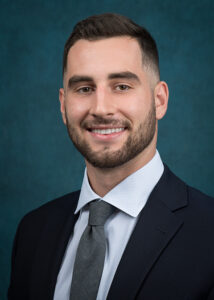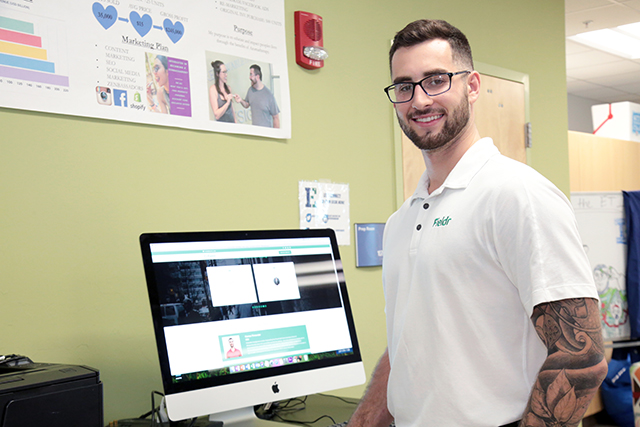In hindsight, Connor Firmender recognizes telltale signs of being a self-starter during his youth in Connecticut. Sidewalk lemonade stand? Check. Mowing lawns in summer, raking leaves in fall and snow-blowing driveways in winter for cash? All of the above. Side hustle was the teenager’s main game.
“Everything was pointing toward entrepreneurship, building something of my own,” he says now. “I’m not the most fond of working for other people. It works for a lot of people — I completely respect that — but that’s not me.”

Despite all early signs of a self-made man to be, Firmender dipped his toes into a handful of different degree programs at Florida Gulf Coast University: marine biology, communication, business management, resort and hospitality management. Finally, an introductory course in the burgeoning interdisciplinary entrepreneurship program inspired him to dive into the degree he graduated with in 2019. By the time he was handed his diploma, he’d already founded two startups.
One of them, a software solution that matches students with employers for internships and career opportunities, grew from a classroom business incubator project into a bona fide business with a growing list of licensees including Lee and Broward county school districts. From one freelance software developer, it has already expanded to a part-time team of four.
The business world is noticing, too. Gulfshore Business magazine this fall named Firmender to its “40 Under 40” list celebrating outstanding regional business and community leaders younger than 40. He also shared the 2019 Southwest Florida SCORE Entrepreneur of the award from a local chapter of the national nonprofit that mentors and counsels small business owners. Positive reviews are coming from clients, too. Ian Ackerman, a financial advisor at Northwestern Mutual, said on LinkedIn that his firm was able to find its top producing intern through Endevr. “It’s made the process of finding quality candidates simple and helpful. I’d highly recommend (it) to any other employer.”
It’s all paying off. The 23-year-old says he’s “close to closing” a $350,000 deal with an angel investor in the coming months. That’s a game-changer for any up-and-coming entrepreneur, one of the signs of the concept is turning a corner in in the journey to success.
“If you’re starting a company and you feel a shift — from pushing your product out to having them come to you and you feel that pull – that’s when you know,” Firmender says.
Finding an opportunity
Originally called Fieldr, the startup was rebranded recently as Endevr, after CEO Firmender and one of his co-founders parted ways this fall and he restructured the company. A web-based application, Endevr streamlines the student-employer connection by allowing high school and college students to securely create profiles and apply for posted positions on a school-branded job board; employers also register and post service opportunities, internships and full-time jobs. Schools also are able to track students’ work hours and run reports through their exclusive interface to document success.
Within six months of launching, it had about 500 users, according to Firmender. Other platforms with similar functions already exist, such as Handshake and Simplicity, but Endevr’s advantage is expanding the ability of job seekers and job posters to communicate with each other, he says.
“The algorithm matches students to listings and allows employers to view candidate pools to find the right talent quickly. They can communicate through direct messaging, file sharing and advanced search abilities,” says Firmender, noting that good matches result in higher employee retention. “In talking to employers, we’ve found a lot of graduates leaving jobs within 18 months of hiring. A lot of the time, students don’t pursue internships relevant to what they want to do. It’s not until they’re near graduation and need to find a job. Then they realize it’s not the job they wanted after all.”
He knows whereof he speaks. Firmender doesn’t mind mentioning that he was fired from two internships by the time he was a sophomore. “It goes to show the flexibility and fluidity you need in navigating your path. I didn’t let anything hold me back.”
Still searching for direction in his second year at FGCU, he signed up for an entrepreneurship elective to try to figure out his next step. “That’s where I started getting a glimpse into the possibilities that could be out there if I dedicated myself to it.”
One of his first classes was with Assistant Professor Jason Lortie, who was initially skeptical of the fast-talking undergraduate but “came around to the fact that he’s legit.”
“I kind of wondered, was this kid playing me?” Lortie says. “It’s the hustle mentality – he has it. It rubs some people the wrong way, but he’s just hustling because he wants to do as much as he can. He has the right mindset for doing things the right way. He overwhelms you with being so honest and so dedicated that you just give in.”
Putting in the hours
Firmender so impressed another professor that she recommended him for an internship at Wear The Fund, a socially conscious custom apparel company in Fort Myers that donates a percentage of sales to community nonprofits.

“It was one of the main experiences that shaped me,” Firmender says. “I loved the business model and culture there. It resonated with me.”
Firmender joined the startup as an unpaid sales intern in summer 2017, at a time when he’d already launched an event and talent management company, VIIX Entertainment (he stepped down from it in 2018). All this while finishing his education. With so many irons in the fire, Firmender figures he was devoting 90-100 hours a week to working his two gigs and going to class and studying — while sacrificing a lot of the usual social amenities of college life, not to mention sleep. He saw it as an investment in the future. By the time he left Wear The Fund in 2019, he was a full-time executive managing a $1.25 million sales portfolio and had gained firsthand knowledge and experience in sales, marketing and business development in the startup world.
“It was a grind, but it was well worth it,” he says. “I got so much out of taking on those roles and responsibilities all at the same time and submerging myself into the world of small business and entrepreneurship and startups. I don’t do anything I’m not passionate about. If I work hard now in the future I can be financially stable and dedicate more time to having fun. One of my mantras is ‘Do what you love and you’ll love what you do.’ ”
Another value he feels passionate about is giving back to the community. He devotes volunteer time promoting entrepreneurship and college readiness in several area high schools and encouraging education through FutureMakers Coalition of Southwest Florida and Junior Achievement of Southwest Florida. He expounds on some of his philosophies — as well as lessons learned from game-changers like Steve Jobs, Walt Disney and Tony Robbins — in “The Ever-Evolving Art of Balance: Self-Education for a Well-Balanced Life,” a book Firmender wrote and started selling on Amazon last July. Perseverance, along with vision and dedication, are among the most important qualities for a successful entrepreneur, he believes. With Fieldr, he tried several revenue models that failed before finding success with licensing to school districts.
“There are a lot of ebbs and flows, ups and downs, success and failure,” he says. “I have made plenty of mistakes, but I’m comfortable doing that. You have to have confidence in your vision and what you’re building because when failure is knocking at your door, it’d be easy to walk away.”
Interest at state level
Instead, Firmender strides ahead with his latest Endevr. He recently finished working with the Bonita Springs-based business accelerator TWO39Labs, a venture-capital arm of The TWO39 Group. “It’s been a huge blessing,” he says.
Early next year, Endevr goes online with Broward County Public Schools — the sixth-largest school district in the nation and the second-largest in Florida. And more licensing deals are “in the pipeline” with at least five school districts around south Florida as well as vocational colleges, he says.
“More and more, career placement is going virtual,” Firmender says, a trend emerging even before the COVID-19 pandemic constricted face-to-face meetings. “The Florida Department of Education is trying to streamline career placement across 74 school districts and is considering adopting us at statewide level. They approve of how we’ve gone about this. We have monthly check-ins with them. They’ve given us a really good indicator of product-market fit. A year from now … we could be statewide.”
Lortie, his former professor, isn’t surprised. He’s seen a lot of undergraduates with big ideas but who don’t have what it takes to get a meeting with the right people who can take it to the next level, especially at the government level.
“Connor is special,” Lortie says. “He has this amazing ability to network with people, that hustle mentality. He’s not going to be stopped. Some students begin to doubt themselves as soon as they face rejection. It’s hard to say how successful he’ll be with this, but he’s working really hard with it. One of the things I know is, if he’s not successful with this he will find something that will work.”